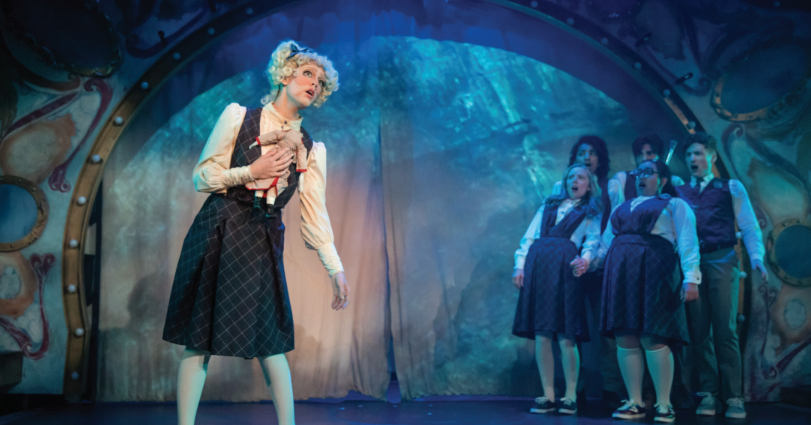What it really takes to make it as an actor in the Twin Cities.
Words by Isabelle Wattenberg
When asked about living as an actor in the Twin Cities, actor and dramaturg James Rodriguez offered this: “Artists are really human beings here.”
With a lower cost of living, strong community focus, and concentration of theater companies dedicated to magnifying underrepresented voices, life as an actor in the Twin Cities has undeniable attraction. At the same time, the theater world is still reeling from the effects from the pandemic and demands body-and-soul commitment from those who pursue the art. We spoke with four actors to get the details–sobering and joyful alike–about what it takes.
The Rising Action
Isabella Dawis is a Filipina American actor, opera singer, and playwright whose accolades include roles with the Guthrie Theater and the Minnesota Opera. After performing in New York for several years, Dawis returned to the Twin Cities to shelter from the pandemic, at which point her love for the local theater scene solidified.
“The theater that’s made here and the purpose of why we’re doing it, and the people it’s trying to reach–it just speaks to me,” she says. “And the Twin Cities theater scene has a very rich history of being community-oriented and wanting to create spaces and centers of energy where people can find a home.”
Like Dawis, Rodriguez envisioned himself on New York stages when he first graduated with a degree in music theater. He spent a couple years saving money and performing in the Twin Cities and discovered that the scene met all his needs–not just creatively, but also with standards of living (like the ability to buy a house). Sixteen years in, Rodriguez’s resume includes nearly every local theater in the metro.
“I realized quickly the quality of the actors here was really exquisite and rich,” he says. “To this day I really believe that because of the nature of the Twin Cities being such a conducive and supportive place for artists, the quality of the work in a lot of cases gets put before the ego and and the business side.”
A Minneapolis–based actor with a near 20-year cadre of performances, Eric Sharp performs across the Twin Cities although his heart resides with Theater Mu, a Minneapolis-based theater that promotes and celebrates Asian American creatives and experiences. An early love of making people laugh evolved into a passion for–and subsequently a career in–theater.
“It’s always been my goal to be a professional artist, and it’s always been my goal to support myself in a way that goes against that starving artist mentality,” Sharp says. “I’ve had a really happy life and a happy career, and the Twin Cities have made it possible.”
Sun Mee Chomet has acted in the Twin Cities for over 20 years, and the expanse of her roles ranges from multiple Guthrie performances, to acting Bina’s Six Apples at the Minnesotan’s Children’s Theater, where she helped tell a story set during the Korean War written from an Asian American perspective. It was the concentration of Asian American storytelling and acting opportunities that drew her to the Twin Cities.
“I feel like I was born to be part of a new generation of voices that’re being ushered in right now and new stories that just haven’t been told before,” she says.
The Conflict
But being human also means facing uncertainty and job insecurity–for new and seasoned actors alike.
Working in a smaller, more tight-knit community where relationships can be formed person to person, Dawis explained, eliminates the need to employ agents for scouting roles. But this means that actors are responsible for booking everything as well as promoting their image and maintaining a digital presence. And they have to be ever available to arrive promptly and put together for auditions at a moment’s notice.
“I think acting, and the performing arts in general–practicing acting and theater–is a really important cultural and societal skill, and I wish that more people would be involved in it, but I understand why they don’t. The main obstacle is there’s no job security,” says Dawis. “You’re really just fighting for the next job at every moment. I actually don’t plot out my calendar any further than a month in advance because…I do have commitments, but realistically I don’t know what’s going to be happening any further out than a month.”
Acting jobs in the Twin Cities rarely last longer than twelve weeks–unless you contract with a commercial venue like Chanhassen Dinner Theater–which means actors are unceasingly searching for the next role. For seasoned actors this timeline can stretch a bit–veteran Chomet says she tends to be booked out a year in advance–but the uncertainty never fades.
“I teach sometimes through the Guthrie through the BFA program; I’ll teach workshops, I’ve done some racial equity teachings through the Penumbra Theater,” she says. “So you kind of mismatch things together to use the skills you’ve honed. I’ve done commercials for the Minnesota Lottery, and print [ads] for Target.”
Acting doesn’t provide Rodriguez’s sole source of income either, and he supplements his acting with other theater positions, including theater management work at the Jungle, and a post at the Science Museum of Minnesota’s Live Theatre programs where he “does everything from blowing stuff up in the atrium to working with live monarch butterflies, and everything in between.”
“I’ve had a number of survival gigs–luckily most of them have used my skill set,” he says. “I’ve never worked an office job that wasn’t theater related.”
The Denouement
Sharp views the necessity of supplemental income with an additional lens. He’s proud to take voiceover work and unusual gigs, such as performing medical sales simulations at training seminars, because they represent important opportunities that Asian Americans should be able to pursue and see themselves in. As an Asian American actor, Sharp pointed out he’s never had a blueprint to follow, and studying theater amidst mostly white kids was very isolating. He said he’s excited to break open the possibilities to future actors.
“My goals are to be of service to this arts community and to be of service in as many different ways as I can,” he says. “’I’m still a professional actor–I think that will mostly be my primary way of contribution–but I love teaching. I love being that hub or that point in the network that can then branch off and allow other folks to come to the table… I want to keep expanding this idea of what it means to be an Asian American actor, and not just for me but for everybody going down that path.”
Chomet’s path, in 2022, led to performances in four world premieres–including Sally & Tom, where she fulfilled a longtime goal of working with director Suzan-Lori Parks. She acknowledges that acting is a fast-paced and physically taxing pursuit, and when selecting roles she balances the physical demands–and compensation–with ensuring “that my heart is in the story that’s going to be told.”
“I’ve never wanted to do anything practical,” Chomet says with a not-small amount of glee. Chomet has loved theater since childhood and still recalls watching a play in her youth that earned a 20-minute standing ovation and brought the audience to tears.
“Theater has the power to change people internally for the rest of their lives,” she says. “That’s what we’re chasing. That’s what I’m chasing.”
Rodriguez feels this chase too, and as he explains, this power is more crucial now than ever–and that only raises the stakes for seeing, honoring, and fostering theater.
“I think that the biggest challenge is telling stories that are indicative of the times we live in using the bodies and voices of all artists of all walks of life,” he says, ”and getting the buy-in of audiences that may not be used to seeing the theater that has come out of that, and getting them to invest their time, their money, donate to theaters. Coming out of this pandemic, theaters are struggling to provide value in a more equitable way. To be of value for everyone, but also support artists. There are people that need to get paid to do this terribly important work.”
Curtain Call
So the actors have a call to us, the audience. The pandemic has embedded a hesitation to join crowds among many–and understandably so. But as we’re setting our own comfort levels when it comes to calculating risk, it’s worth considering the value of live theater.
“Now is the time to be adventurous—for audience members, for artists, for just people!” Sharp says. “It would be very easy to just become more hermetic, more closed in, more insular, because of what these last few years have been like. But I really encourage people to reach out and put your energy in a room, whether that’s as an audience member or as an artist. What’s really cool about the theater is that the audience is the last part of the collaboration that has to be there, or our form doesn’t make any sense.”

